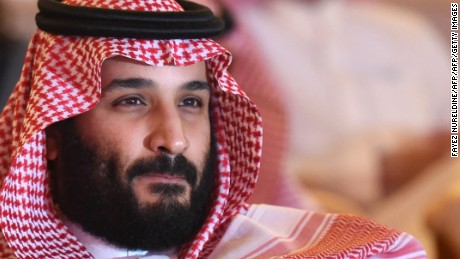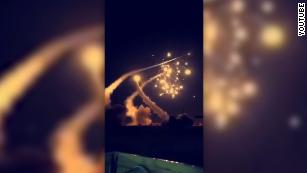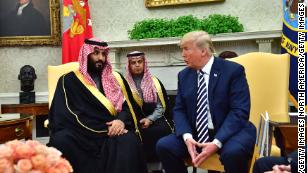Why Houthis have added fuel to fire with missile attacks on Saudi Arabia
(CNN)On Sunday night -- the eve of the third anniversary of the war in Yemen -- the Iranian-backed Houthi high command unleashed their biggest barrage of ballistic missiles so far in the conflict.
Shortly afterwards, the Houthi-controlled defense ministry in Sana'a, Yemen's capital city, claimed responsibility for the seven long-range rockets, which were fired at Riyadh, the capital of Saudi Arabia, and several smaller Saudi cities close to the Yemeni border.
Saudi defense officials say that all of the missiles were successfully intercepted, but that falling debris killed one Egyptian. The Houthis claim that is a lie, and that some of the missiles did hit the intended targets.
Saudi Arabia: 7 missiles fired from Yemen, 1 killed from falling debris
Whatever the outcome, this is by far the most brazen attack yet on Saudi soil by the Houthis. It highlights the conflict's spread, the danger to civilians and the failure of all sides -- even with international help -- to find a formula for peace.
Late last year, the UN issued a report criticizing both the Saudi-led coalition and the Houthis for not doing enough to avoid civilian casualties. The Saudis have since been on a public relations offensive to show the lengths they are going to avoid unintended deaths.
The UN also called Iran to account for not doing enough to stop their ballistic missiles getting into Houthi hands.
How important is this attempted attack?
These missiles are an inescapable in-your-face gesture. It will be hard for the Yemeni government, for the Saudi-led coalition and the UN to ignore.
But perhaps the most dangerous factor in all of this was the picking of a moment when Saudi Arabia's most powerful man -- Crown Prince Mohammed Bin Salman -- happens to be out of the country on a two-week visit to the United States.

Play Video
The 32-year-old trying to revamp Saudi Arabia 01:42
Dangerous, because it gives grist to his calls on President Trump to get tough with Iran.
Right now, Trump might be more than receptive to that idea, having recently hired more Iran hawks to his administration.
Why is it different this time?
The Houthis are pouring fuel on fire that is already raging.
Rather than tamp down the flames and negotiate, they have instead upped the stakes.
Over the past few weeks there have been hints that back channel talks were bridging gaps. These missiles will likely cause any such talks to cease.
How might Saudi Arabia respond?
Bin Salman took huge international heat over his blockades of aid getting to Yemen late last year. He had to back down as his weapons suppliers -- Western democracies -- had to beat back their critics.
Could he be forced to do so again? Sure he could. Bin Salman is young and, in the eyes of many outside the region, ambitious and impulsive.
But he might also try to play this attack to his advantage -- marginalizing his enemies and drawing his allies closer.
Last year, the US was fast to back Saudi claims that the Houthi missiles were made in Iran -- the UN eventually caught up with a similar evaluation.
Were the world not at a moment of great diplomatic division, a more cohesive UN response could be conjured from this mess. But right now that seems very unlikely -- certainly not without risking a Russian veto at the security council.
Trump's Saudi ties may come back to haunt him
Just last week, as President Trump was touting his new multi-billion dollar weapons deals with Bin Salman, the two leaders were already almost perfectly in lock step on Iran -- and the need to end the President Obama-era Iran deal.
News Courtesy: www.cnn.com
The Houthi missiles will undoubtedly have accelerated that thinking.
In all likelihood, Trump's new National Security advisor, John Bolton, will be sharpening his anti-Iran arguments, aided by incoming Secretary of State Mike Pompeo. Bin Salman is exactly the ally they need right now.
And he needs them too, to stop what he sees as Iran's hegemonic regional expansion.
This is serious, different, and while most of the world may be insulated from fallout of this attack, the tremors of the response will likely be felt in relations between capitals around the world.













